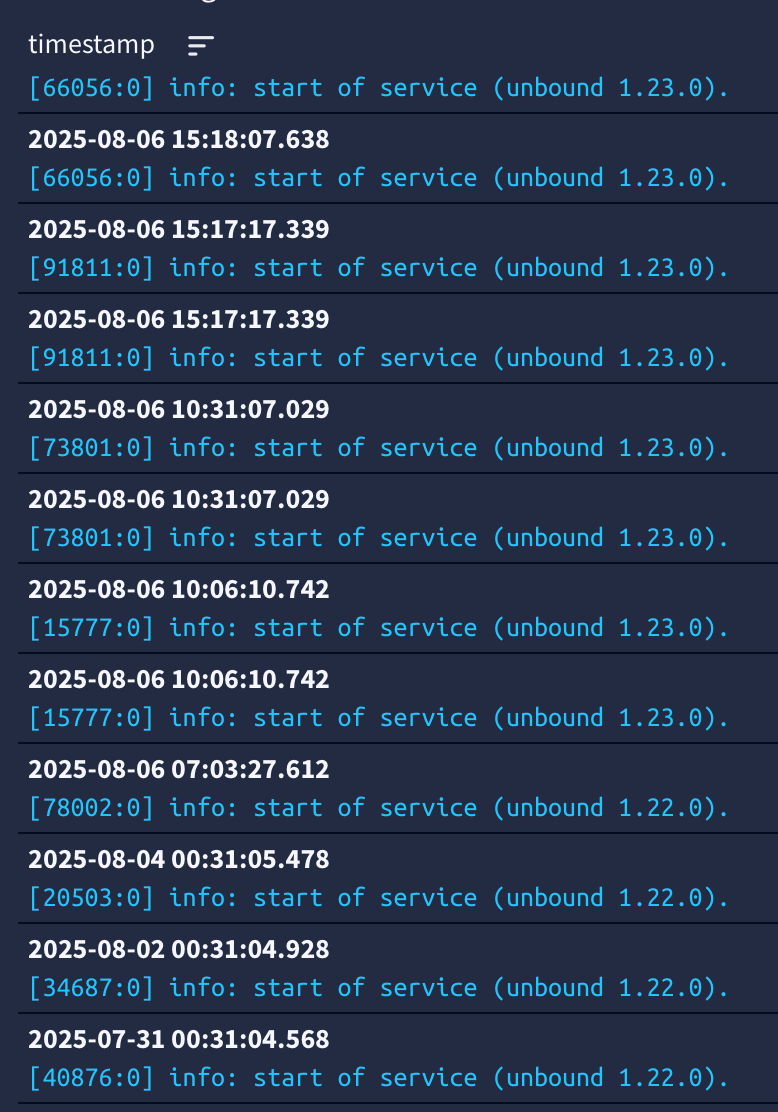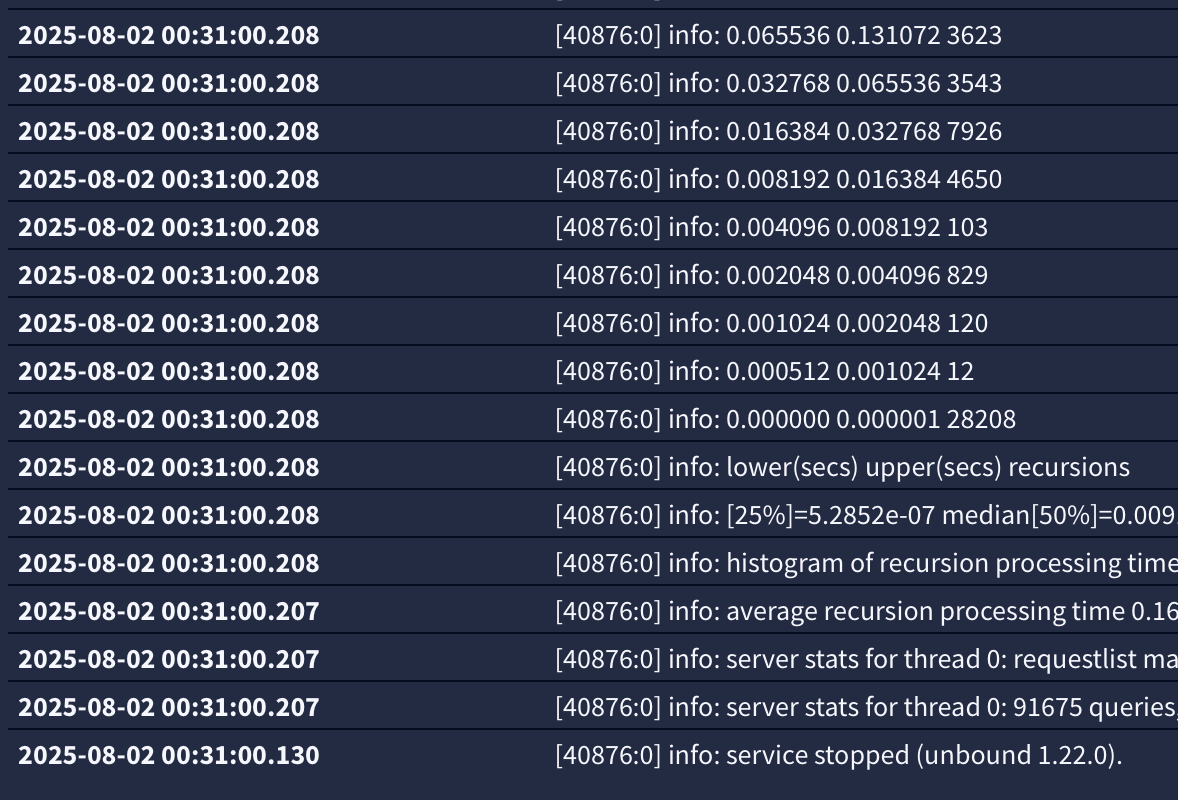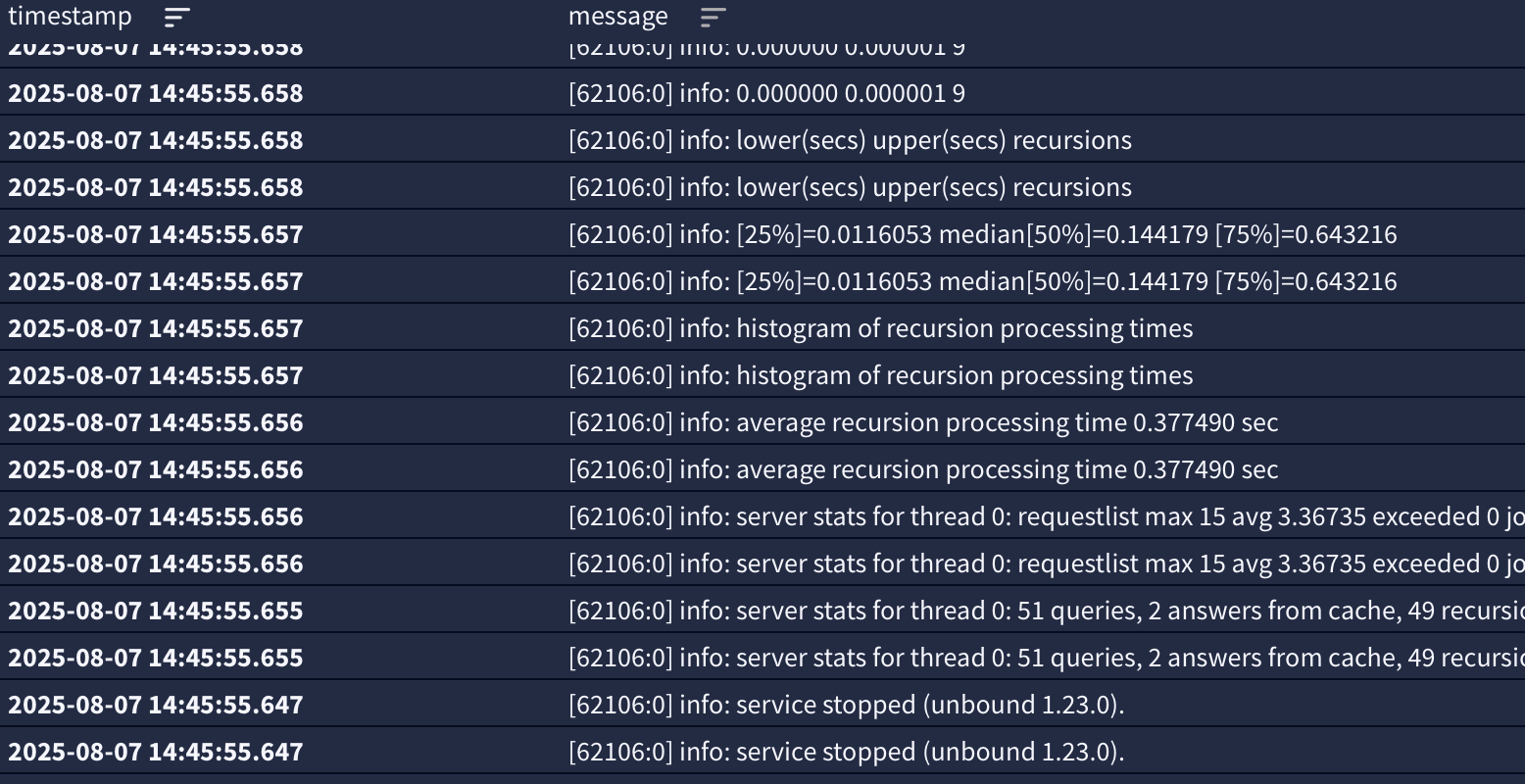25.07 unbound - pfblocker - python - syslog
-
Well in my test setup I can reliably reproduce it killing syslogd. It's fixed in internal dev versions though so something needs back porting.
Now it could be that it keeps functioning as long as at least one remote server is available...

-
@stephenw10
In our experience syslogd dies if any target is unreachable, as noted above.
-nic -
This is just information -
I started up my 2.8 test boxPointed to a single syslog server on a different subnet - the subnet is reachable (one that I can log to if I select the correct IP) but has NO syslog server at the IP I selected. this ended in a Connection Refused (9.25:44)
The service was still running, but I hit restart anyway (from the services page) also Connection Refused (9:30:25)
Yup in both cases the IP has no server (offline)Service still running. Changed the IP to a destination on the local subnet (no exception that there is a working server on this IP either).
Notice there is no "Connection Refused" in this case, but rather ends in "Host is down"
The service itself hasn't "died" at least not yet (time of posting this) but radio silence from syslogd (nothing else in the logs)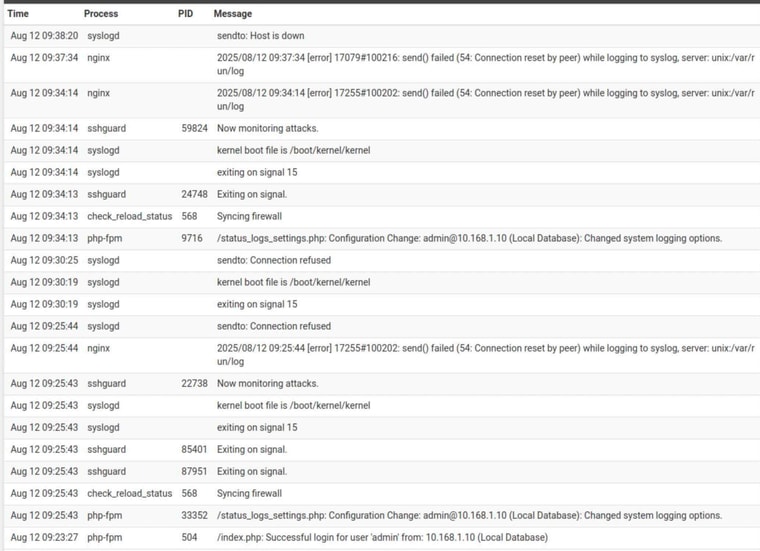
-
Something must be wanting to write syslog (maybe) it has just started aggressively logging this and many times per second (wonder if it is heading for a crash)
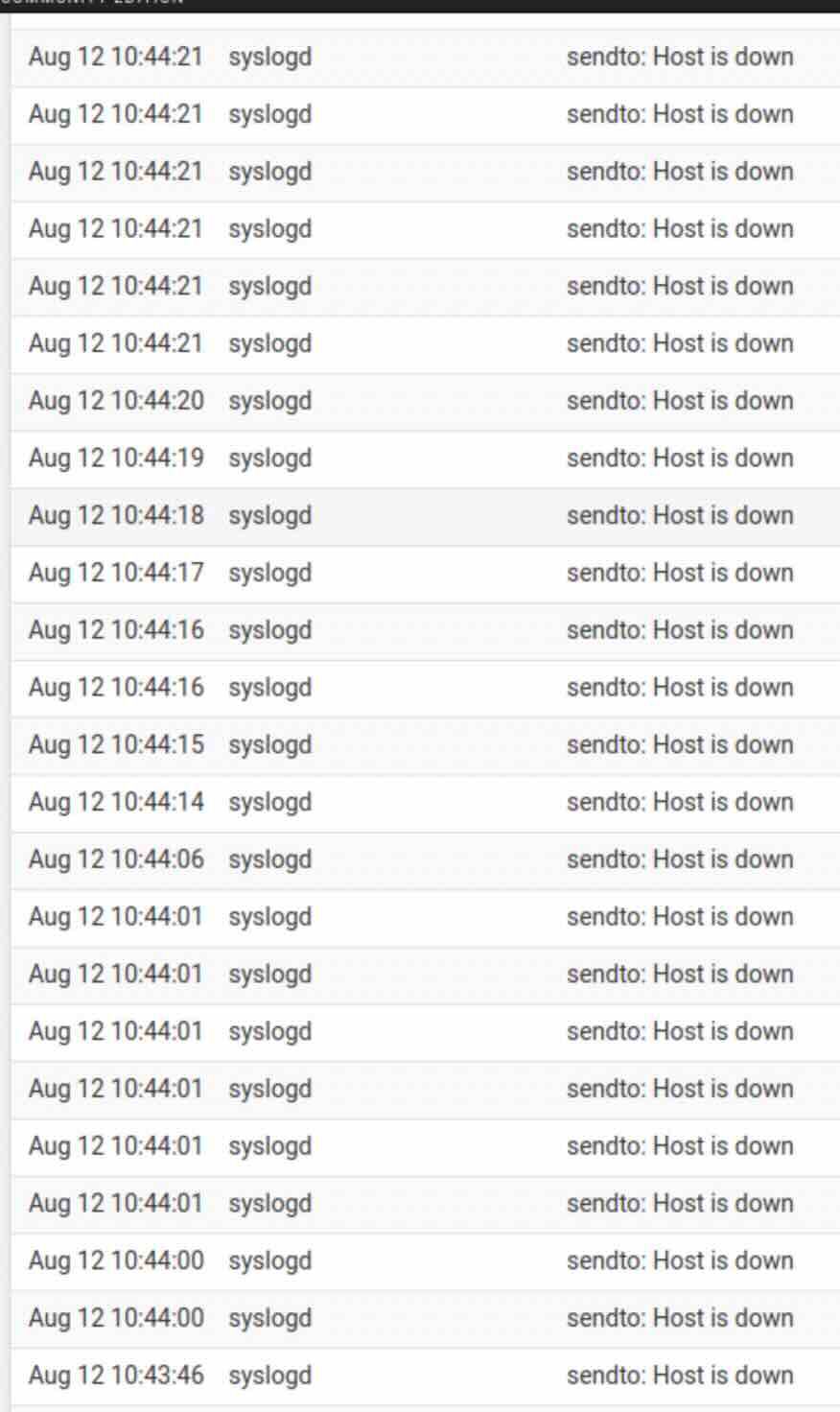
This really aggressive syslog host is down lasted until 10:54 (so about 10 minutes) then the stopped logging, the service is still running.
I'm guessing these messages are generated with something is trying to write to syslog - and it feels the constant urge to log that the host is down.(funny I don't see this on the production box when the syslog server is down) that might be a result of the production box having two destinations setup)
Should be able to verify this on the test box.
start case1 - with syslog1 (.35). to a host that goes down, syslog2 (.2) to a valid service. (this would simulate production)
then flip them case 2 - syslog2 (.2) always up, syslog1 (.35) goes down for maintenance (offline)since I don't see "host is down" messages on production (or "connection Refused" for that matter) I'd almost guess the order in which they are listed makes a difference to the message. If the valid service is second on the config it is "overwriting (masking)" failure messages from first server that is offline)
Overall then the system "thinks" the message to both was "sent", even though the first one never got it.
-
Yup that's what I see with a target that doesn't respond to arp. I'd guess it gets into a loop logging the host is down and then trying to send that to the syslog server. Repeat!
I was only able to replicate the service failing when using a target that actually responds to the traffic with refused.
-
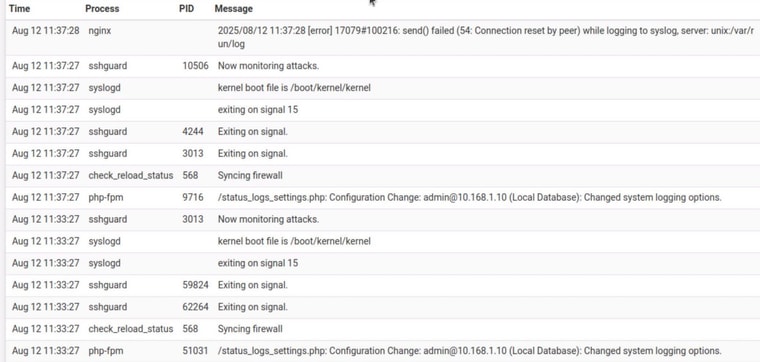
There you go, order matters (but also n both cases there is no indication of a Host is Down or connection refused.
bottom up in the log changed to add a working server in the second spot
(.35) (.2) .35 is offline
switch them
(.2) (.35) . 35 is offlinenotice nginx logged it but syslog itself says nothing in either case ...
That explains why I don't see host down or connection refused in production. it is being masked by having two servers, (in both cases)
I'm going to flip the order in production to see if it changes the overall "it resumes logging" when it goes off line and comes back up.
-
so flipping the order on production (.2) (.35). taking .35 offline and back. did not resume the logging to that IP - I still had to kick it. (.2) as before got everything in both cases
Syslog itself still didn't log (down or refused) but at least I have another reference, the nginx message now shows,
same as on the test box. which is at least better then nothing.back to using my auto kick start script for now.
Carry on.
Thanks -
@jrey @stephenw10 - I'm adding to this thread; I hope that's acceptable...
I have a somewhat different and perhaps more simple environment with a Netgate 4200 now updated to 25.07.1 .
My issue is (also) syslogd dying. In my case, I run most infrastructure services elsewhere on my network, so I'm not running e.g. unbound (nor wireguard or dhcpd).
I have syslogd on the 4200 set to send logs to a server running a containerized Logstash. That's a non-HA setup.
I can also add that it appears that pfSense syslogd doesn't die at the time the target service goes down - it dies when the service is transitioning to being up.
I'm curious as to whether anyone has come up with any workarounds to this - other than writing some sort of script to run on the 4200 - such as configuration that might not be accessible via the UI?
Happy to help if there's any debugging in my environment that could clarify things.
Thanks!
-
@kmp said in 25.07 unbound - pfblocker - python - syslog:
I can also add that it appears that pfSense syslogd doesn't die at the time the target service goes down - it dies when the service is transitioning to being up.
the behaviour seems to be slightly different depending on having 1 or 2 receiving systems setup - specifically as to if it syslog continues, dies outright and/or actually logs anything about the trouble it has encountered. clearly however if one remote dies, one continues, so the syslogd doesn't really die. @stephenw10 never really mentioned if it was going down or trying to recover, but in that redmine, there is a brief comment about "it takes about 10 minutes".
I think we are just in a hold and see what happens upstream as the root cause is clearly in syslogd - the redmine created the redmine (link above in thread) but unless they work some release magic, it will likely be a while. I had actually thought of using the Boot environment and just rolling back to 24.11 where it worked fine but then the little script I wrote is working fine on recovering from the issue, so here we are..
thanks for the offer though.
-
It seemed to be around 10mins at the time but having tried to replicate it with debugging it's not that simple. I failed to do so in the time available. I'll be re-testing that next week.
-
I noticed that 2.8.1 RC released with a note about syslogd so I went to track down what actually changed from the redmine numbers final looked here to see "this change and description last week"
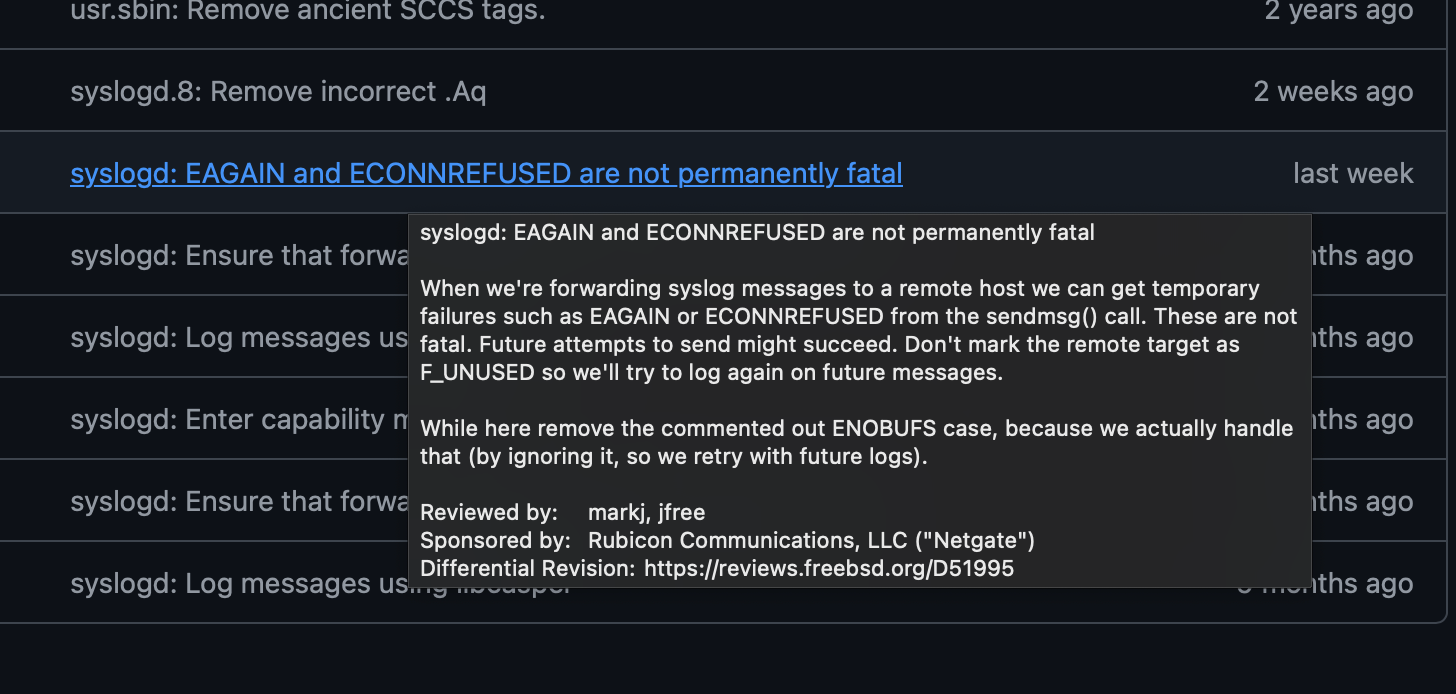
did this make the 2.8.1 RC release ? wasn't clear from the timing and notes. I had previously upgraded / tested 2.8 as part of this issue and confirmed the failure there --
the diff associated specifically with 2.8.1 RC doesn't list this so I'm guess it is not there.? (but sometimes stuff gets built and not include in the notes)
if this noted change made the cut I'll jump through the hoops on 2.8.1 RC and test it, but if it for sure missed the cut not in this RC, I'll wait..
Thanks
-
I'm away at the moment and can't check directly. However I don't believe it includes that. 2.8.1 is intended to be as close to 25.07.1 as possible so that testing/bugs apply similarly to both. It looks like it was the source address binding that was fixed there.
I'll be back on this next week. -
J jrey referenced this topic on
-
Im having the same issue.
Im sending to elastic angent and each time I kill the elastic angent and it stops listening on port 9001 the syslog stops sending.

I do see a weird destination unreachable ICMP before that on my log collector host.

-
It would be the recovery from that -- look at the code referenced - syslogd and the changes are specifically related to EGAIN and ECONNREFUSED messages (they were not being handled) -
not having them processed causes all kinds of interesting artifacts -and different when sending to a single server vs multiple servers (I have 2, and the order they are listed also changes the behaviour that is if one goes down and the other does not, which is my case)
Because in my environment I know exactly when the issue is going to occur because of a fixed schedule maintenance window on one of the syslog servers) I have a script that monitors that receiving device and restarts syslog accordingly after it detect the system/port are back and available)
Other than that "tiny little issue" as far as I can tell it is rock solid in processing messages.

The only option for us currently is to wait for the new build of syslogd - so that it just recovers like it did before, back in the 24.11 days.
-
I'm running into a similar issue after upgrading to 25.07.1.
I see this in my logs:
2025-09-02 10:51:05.870660-07:00 syslogd - kernel boot file is /boot/kernel/kernel 2025-08-30 04:48:40.984805-07:00 syslogd - sendto: Connection refused 2025-08-29 02:28:48.148564-07:00 syslogd - kernel boot file is /boot/kernel/kernel 2025-08-23 04:47:30.000287-07:00 syslogd - sendto: Connection refused 2025-08-19 11:35:12.527643-07:00 syslogd - kernel boot file is /boot/kernel/kernel 2025-08-19 11:30:45.904435-07:00 syslogd - exiting on signal 15 2025-08-18 18:21:26.032560-07:00 syslogd - kernel boot file is /boot/kernel/kernel 2025-08-16 04:47:40.955468-07:00 syslogd - sendto: Connection refusedI get
sendto: Connection refusedin my logs, and that's when syslogd dies.You can see this almost always happens for me around the same time at 4:48AM. It's also every 7 days.
I run Graylog via docker on my server. Every Saturday morning I backup all of my docker containers starting at 4 AM, and this means stopping each container while it's being backed up.
I tested this today by stopping my Graylog container, and in less than 2 hours syslogd had stopped running on pfSense.
-
Yup, I'm back on this now. Trying to replicate with debugging....
-
@stephenw10 I tried testing this a few times today. Twice it took about 2 hours before it stopped, and a third time it took maybe 4 hours before it stopped.
I'll try testing some more, but it's not consistent.
pfSense will immediately post that
sendto: Connection refusedlog event once I shut down Graylog. But then 1 to maybe 4 hours later, thesyslogdservice stops. -
the "if it stops" is based entirely on number of messages (memory available / used) and several other factors, like sending the results to more than one server.
on the other hand, the bottom line is the current version of syslogd is not currently handling the EAGAIN and ECONNREFUSED conditions. Looking at the code repository these were only added back to the code a couple of weeks ago and after the last release. These are not, as noted in the screen capture of the "change" (see above) not permanently fatal (from a messages point of view) and therefore needed to be in list of events "that could happen" but that would then eventually just retry when the remote comes back on line.
-
@stephenw10 said in 25.07 unbound - pfblocker - python - syslog:
Trying to replicate with debugging....
for clarity, you mean in the code with the fix right ?


-
Not yet unfortunately. Just trying to make it fail with debugging enabled. Seems to really want to not fail!

